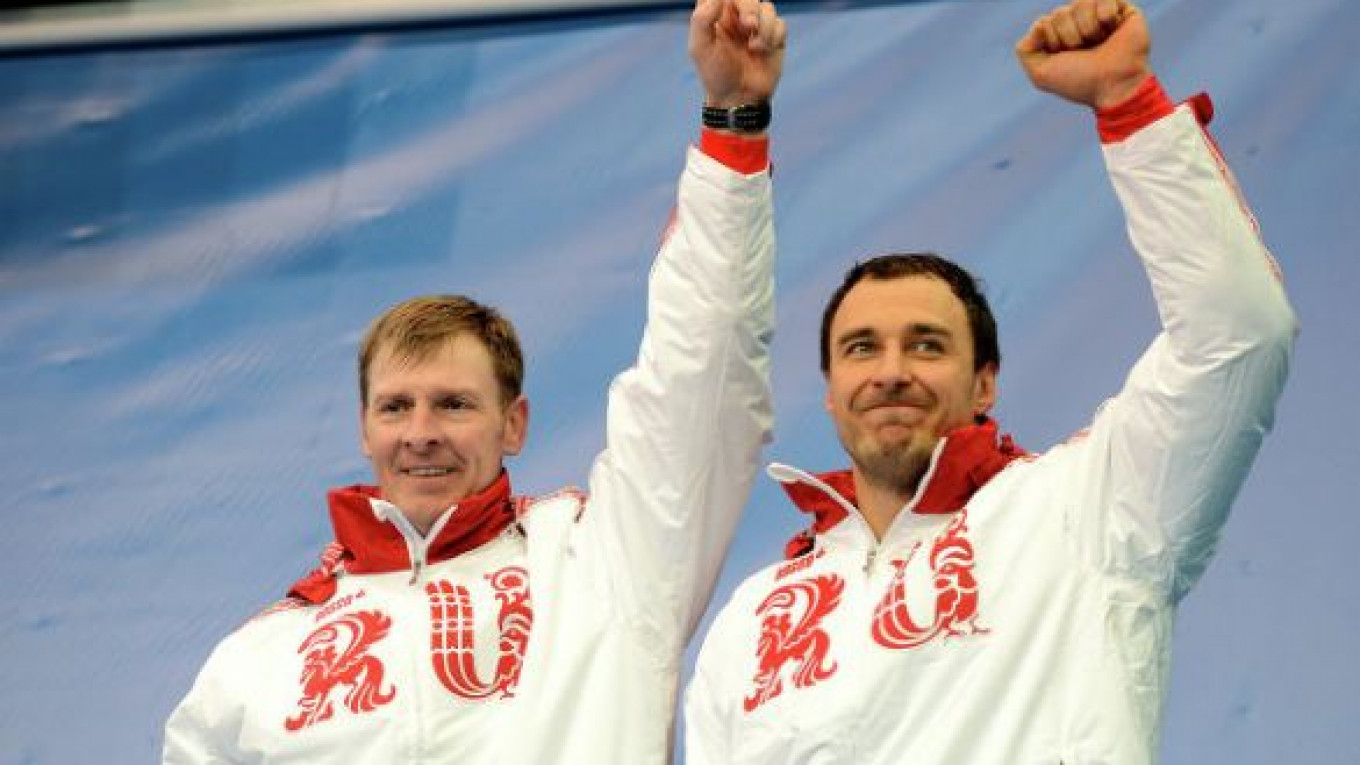KRASNAYA POLYANA — Carrying Russia's flag at the Sochi Olympic opening ceremony was an honor for bobsledder Alexander Zubkov, but it was also a burden that could have crushed another athlete.
As he marched out into a rapturous Fisht arena, Zubkov, whose best accomplishment was second at the 2006 Olympics,was introduced to millions of Russians watching on television as a "phenomenal man" and "mega pilot."
Russia gives its flagbearers huge publicity, and there is evidence this can be anything but helpful. Since handball player Andrei Lavrov in 2000, none has gone on to win gold. Until Zubkov, that is.
The 39-year-old veteran looked every inch the mega pilot as he threaded his sled through the curves of the Sanki Sliding Center at a pace the opposition could not hope to match. Four runs later, Zubkov and brakeman Alexei Voevoda had secured the first bobsled gold in Russia's history.
But what about the curse of the flagbearer? "Now you see it is just superstition," Zubkov said.
Voevoda, 33, a Sochi native, vegetarian and three-world armwrestling champion, paid tribute to his teammate.
"It is a big honour for me to be in Zubkov's team," he said. "If I am to compete in the Olympics but not in this team I could have given up my place to somebody else. For me, as for all real sportsmen, it's everything or nothing."
Zubkov and Voevoda led throughout the competition and won by 0.66 seconds over the second-placed Swiss sled of Beat Hefti. On the way to victory, they broke the track record twice, lowering it to 56.08 seconds on their third run earlier Monday.
"I think we showed ... what we were ready for today," Zubkov said. "We feel that we're Olympic champions."
Hefti and brakeman Alex Bauman seemed to concede that no one could have beaten Zubkov and Voevoda at Sanki, where the Russians enjoyed extensive exclusive practice.
"It is very nice here, we do really like this track, but it is even nicer to leave Sochi with the silver medal," Baumann said.
Steven Holcomb and Steve Langton of the U.S. took the bronze after a tense final run that left them 0.22 seconds off silver and just 0.03 seconds ahead of the second Russian sled, piloted by Alexander Kasjanov.
It is the first medal in the two-man for a U.S. crew since 1952.
"We're going to go down in the record books," said Holcomb, who competed despite a calf injury. "It came down to three things, a great push, a great drive and great equipment."
Russia's previous best result in bobsled was silver for Zubkov's four-man crew at the 2006 Olympics, a team which also included Voevoda. It is the second sliding sport gold in Russia's history, following Alexander Tretiakov's victory in the men's skeleton on Saturday.
"You have confidently proceeded through the entire length of the competition, holding off competition from experienced and renowned opponents," President Vladimir Putin said in a statement addressed to the bobsled pair.
"In an exciting and tense battle, you displayed the qualities of true Olympians and won. You have given millions of our fans a big, real celebration."
Zubkov and Voevoda have won the full set of Olympic medals — gold, silver and bronze — together, with the Sochi win and Turin silver joined by two-man bronze in Vancouver in 2010.
After crossing the finish line, the pair opted to celebrate separately, each with members of the Russian support staff, before posing together for photographers. Zubkov will also be in action Saturday and Sunday as pilot of one of Russia's four-man sleds.
It is Russia's fifth gold of the Sochi Olympics, taking the host nation to second in the medal table behind Germany, which has seven.
A Message from The Moscow Times:
Dear readers,
We are facing unprecedented challenges. Russia's Prosecutor General's Office has designated The Moscow Times as an "undesirable" organization, criminalizing our work and putting our staff at risk of prosecution. This follows our earlier unjust labeling as a "foreign agent."
These actions are direct attempts to silence independent journalism in Russia. The authorities claim our work "discredits the decisions of the Russian leadership." We see things differently: we strive to provide accurate, unbiased reporting on Russia.
We, the journalists of The Moscow Times, refuse to be silenced. But to continue our work, we need your help.
Your support, no matter how small, makes a world of difference. If you can, please support us monthly starting from just $2. It's quick to set up, and every contribution makes a significant impact.
By supporting The Moscow Times, you're defending open, independent journalism in the face of repression. Thank you for standing with us.
Remind me later.






